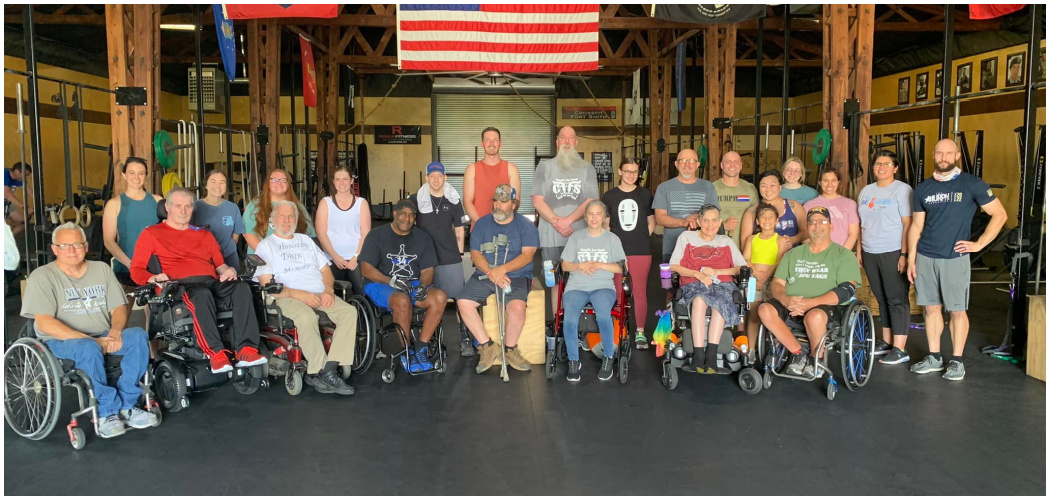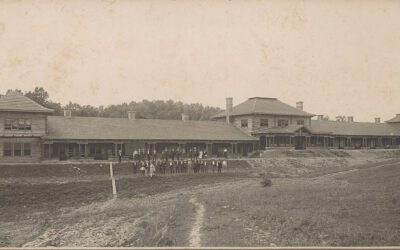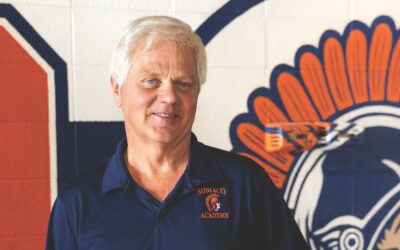In May 1985, Alma native Doug Moore suffered a motorcycle accident that left him a paraplegic. Not content to let one day define the rest of his life, Doug launched a local wheelchair basketball league in 1986 and competed in wheelchair sports for the next thirty-five years. But for as active a life as he’s led, one activity appeared to be out of reach for even this never-say-die competitor.
“I have several friends involved in CrossFit and I actually went to a CrossFit gym five or six years ago and talked to the instructor,” says Doug, age sixty. “He just scratched his head and said, ‘I got nothing for ya.’ I left thinking, maybe that’s not for disabled people.”
Retiring from wheelchair basketball in 2020 over COVID concerns, Doug couldn’t have imagined the next chapter in his athletic journey would include the very activity he thought was beyond him. Earlier this year, he took a chance on a new CrossFit training program designed specifically for patients dealing with Parkinson’s and spinal cord injuries. In so doing, a whole new world has opened to the longtime Southwest EMS dispatcher.
“When I got approached, they explained the program and asked, ‘Would you be willing to try it?’ I said, ‘Sure, I’ll try it,’” he says. “I was a little apprehensive but decided to give it a shot and see what the outcome was going to be. It’s been fabulous.”
“I think initially when individuals hear the word ‘CrossFit’ some folks may think of injury or getting hurt or that it’s so hard or intense that they can’t possibly do that,” says Kaci Handlery, who with her husband Reed, are the architects of the program. “That was Reed and my job to convince them you absolutely can. We adapted the exercises both for people with Parkinson’s and for people with spinal cord injury. We can adapt the exercises to wherever they’re at and whatever abilities they have.
“When we were able to convince folks that it’s going to be led by two physical therapists who are wholly capable of adapting these exercises, and once they got to meet me and Reed in person and came to the first class, everybody’s been hooked since then.”
The couple, who both CrossFit themselves, created the modified weight training program as both a community service and as a research program. Trained as physical therapists, the duo both teach as assistant professors at the School of Physical Therapy at the Arkansas Colleges of Health Education (ACHE). When they arrived in Fort Smith from South Carolina in January of last year, they were shocked at the scant available resources that existed for their patients.
“When we looked to see what was available for people with Parkinson’s, with spinal cord injury, with stroke, we Googled it and tried to find places in Fort Smith that offered community-based exercise programs,” says Reed, who specializes in Parkinson’s patients. “Those programs are fairly common where we were from in Carolina, but we found out there really was nothing going on like that in the region, Fort Smith specifically.
“There’s a huge problem with that, because exercise is the most beneficial thing someone with Parkinson’s can do to slow disease progression and suppress symptoms. It actually leads medication as far as actually slowing the disease.”
The couple found programs serving spinal cord injury patients – Kaci’s specialty – was similarly lacking, so they set about creating their own. SHIFT.AR is a series of modified workouts tailored to the two conditions, complete with specialized equipment for people within these categories. They also landed two grants to bring their program to life, one from the Parkinson’s Foundation and one from the Craig H. Neilsen Foundation.
But for as quickly as that all happened, the effort very nearly ran aground for want of a gym space, had it not been for a local gym owner dedicated to inclusiveness.
“Shortly after we moved here, I started sending out mass emails to most of the gyms in Fort Smith,” Reed says. “I really only got one reply and it was almost immediately. It was probably within twelve hours of sending the email, and that was from Wes Sadler.”
Unlike his fellow gym owners in town, Wes, who with his wife owns CrossFit Fort Smith, didn’t hesitate to get on board with the new program.
“Zero hesitation on my part,” Wes says. “It’s a no-brainer to me because our passion since the beginning is to reach anyone who’s willing and interested in fitness, no matter your age or your experience or your abilities. I’ve said ever since CrossFit came about that it’s infinitely scalable. It doesn’t matter what your age or your ability is. If you come rolling in here in a wheelchair, it doesn’t matter.
“When Reed hit me up, I was like this is perfect! These are the like-minded people I want to hang out with because there’s no limitations to anyone. If you’re an eighty-five-year-old person who’s fighting to stay out of the nursing home, we’ve got a place for you.
With a program in hand and a place to call home, Reed and Kaci began recruiting participants for the twice-weekly, seventy-five-minute sessions. Aided by students from the medical college, the duo puts people through their paces, each to their own ability.
“From the adaptive equipment perspective, that’s where my experience in working with individuals with spinal cord injury came in,” Kaci says. “We have purchased with the grant funds, for example, Concept2 ski ergometers, which is an aerobic piece of equipment that’s very common in CrossFit that allows an individual who utilizes a wheelchair to pull right up and use that piece of equipment independently.
“We’ve also used adaptive gripping. Oftentimes individuals with spinal cord injury have a hard time grasping things. We have grip aids that allow them to just enhance their grip during aerobic activity or during strength training. We also purchased some split ropes and adaptive jump ropes, so you get the same stimulus, everybody moves and does the same exercise, but in their own unique way.”
The benefits of the group classes aren’t just physical. Reed says the socialization aspect of SHIFT.AR is every bit as impactful as improved aerobic and anaerobic functions.
“For both groups, but spinal cord injuries specifically, this is the first time many in the class met someone else with a spinal cord injury,” Reed says. “A lot of that’s because of COVID. With COVID people were isolated. Even if they went to rehab, only one patient was allowed to interact at a time, so they lost that social component.
“A beautiful thing about the group classes is even though the exercise is where all the work happens, if you come earlier or stay later, you’re going to see people interacting and talking about things because they have similar experiences. They’ll be talking about different wheelchair cushions or conversations that won’t happen in a typical gym setting if they are the only person there in a wheelchair.
“The social support is the big thing people are getting. Kaci and I do not have a spinal cord injury, we do not have Parkinson’s, so they get something from us, but they get more, arguably, from their fellow participants. It’s the shared experiences that’s really nice to see.”
John McIntosh, age seventy-five, has experienced this firsthand. Diagnosed eighteen months ago with Parkinson’s, he’s been involved with SHIFT.AR since it began.
“I really had no idea how hard I could work out [with Parkinson’s],” he says. “Reed and Kaci have a really well-designed program and it showed everyone that participates that we can still reach a level of activity that gets our heart rate up, makes us sweat, it makes us sore and you leave the workout going, ‘Man, I didn’t know I could do that.’ Was it hard? Yeah, it was hard. But guess what? We all did it. It’s a bit of a confidence builder.
“The other thing about that is it makes you not feel so isolated. When you’re in a group setting like that and you’re with other people that you become friends with, if I have any questions about details or small things that are a nuisance, there are plenty of people to talk to and we do that on a regular basis. We all ask each other questions. We all help each other out. I think that’s the greatest benefit of the program is that you’re with others that share the issues you have on a day-to-day basis. From the minute you get up to the minute you go to bed, Parkinson’s delivers lots of opportunities to overcome a challenge.”
Reed and Kaci have big plans for the program and are hoping to be able to spread the workouts to sites across Arkansas in the near future. In the meantime, the movement that they’ve started in Fort Smith continues to inspire its members as well as the community at large.
“It’s amazing,” says Wes. “I’ve been getting up and coaching a 5am CrossFit class for ten year. When you see a guy come rolling in in an electric wheelchair and he can’t even push his own wheelchair and he’s CrossFitting, doing a variation of the same workout that the college football running back is doing over there, it’s pretty amazing.
“It’s a very humbling experience because we have athletes from some of our other classes that come by just because they want to hang out with them. It’s really a cool deal. It makes it all worth it. I’ve heard from so many people over the years who say, ‘I can’t do that. It’s too hard.’ I send them pictures of these folks and I’m like, ‘Tell me again that you can’t do this. Check this dude out.’ It’s awesome. It’s something that everyone should see.”
SHIFT.AR will begin a new 12-week block beginning August 2. Classes are free and offered twice weekly, Tuesdays and Thursdays, 11am – 12:15pm for the spinal cord injury group and 1pm – 2:15pm for the Parkinson’s group. For more information contact ACHE at 479.308.2243, or CrossFit Fort Smith at 479.242.2337.




